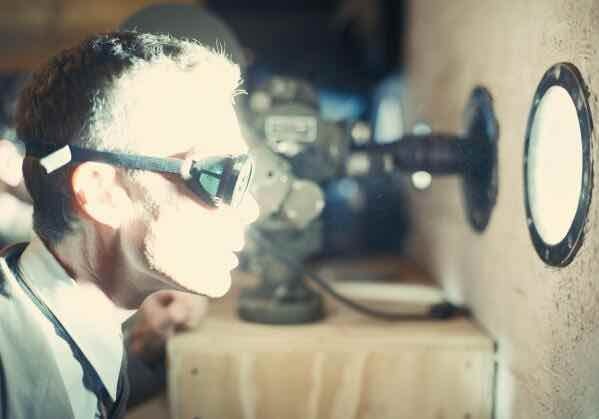Notes From The Program Director | Week of July 21st, 2023
Rich Text
Hello, friends!
Well, it’s here. THE weekend of the summer for movie fans--if not of the whole year--has arrived. From the explosive inferno in the Los Alamos desert that changed the world to the explosive pink of a curvy toy that changed the shape of childhood dreams, it’s time for Christopher Nolan’s Oppenheimer and Greta Gerwig’s Barbie.

As I type, the Wednesday before the films’ previews, the critics’ reviews for both films are just landing in all the major publications, and at this point, both are receiving near-universal praise, each resting right around or just above 90% on the Tomatometer. There is a particularly satisfying, even cathartic, kind of pleasure when much-hyped movies like these two actually meet, or even exceed, critical expectations, and while no movie can ever satisfy every single critic and every single audience member, the rare film that pleases both most critics and most audiences is truly something to rejoice in. And true, though sold-out screenings are being reported across the country with ticket pre-sales (including here at the Pickford), we’ve yet to see how audiences will respond to both films. My dearest hope, however, is that we have an experience this summer of an overwhelming collective love for a movie, maybe for two movies. There are few things better than that kind of enjoyment: people united together in the dark, before the bright light of the screen, transformed and delighted in a collective response.
Since I couldn’t make it to the industry pre-screening of Barbie, I’ll be joining many of you in seeing it for the first time on July 20 (and yes, I will be wearing my pink “Barbenheimer” t-shirt), so I can only predict what my future self of July 21, as this newsletter drops in your inboxes, thinks of Barbie. But I’ve put my hope in Greta Gerwig, whose track record in writing and directing is practically spotless--and also in some of my favorite film critics, many of whom note the film is much more than just a fizzy pink trifle and more than just a corporate-funded Mattel ad. Justin Chang, in his piece “With Robbie in Pink and Gosling in Mink, ‘Barbie’ (wink-wink) Will Make You Think” for the LA Times, writes,
“Whatever you think of Barbie, the mere existence of this smart, funny, conceptually playful, sartorially dazzling comic fantasy speaks to the irreverent wit and meta-critical sensibility of its director. (It also owes something, I suppose, to Mattel’s willingness to endure some modestly scathing satire in the pursuit of ever-greater profits.) Working again with her co-writer, Noah Baumbach, Gerwig has conceived Barbie as a bubble-gum emulsion of silliness and sophistication, a picture that both promotes and deconstructs its own brand. It doesn’t just mean to renew the endless “Barbie: good or bad?” debate. It wants to enact that debate, to vigorously argue both positions for the better part of two fast-moving, furiously multitasking hours.”
 |
Likewise, Aisha Harris, writing in her piece “Is Barbie Corporate Propaganda or Malibu Metacommentary? Why Not Both!” for NPR, rejoices that Barbie is “a hoot, a feast for the eyes and ears” while also noting it is not merely throwaway entertainment, “It's a movie that sits at an interesting inflection point in moviemaking and movie consumption, when almost every idea seems born from a pre-existing product. While it's easy to balk at – and believe me, I have; many, many times – the truth is, the tension between filmmaking and commerce has and always will be present in the work itself, be it a broad Hollywood blockbuster or the most idiosyncratic and Terrence Malick-y of endeavors. Something like Barbie lays that tension bare and exposed in its unabashed commercialism and heightened sensibilities, so that you can't not think about how its aims may be at odds with its execution. But that's also part of what makes it such an interesting oddity to witness. It's a Barbie world you'll be more than happy to have visited, even as it confounds.” And finally, Katie Walsh, writing for the GazetteXtra also comments on the film’s other themes: “In Greta Gerwig’s hands, Barbie is a weapon. The director wields the iconic doll like a broadsword in Barbie, cleaving through culture with gleeful spirit and savage humor. In this existential exegesis on what it means to be a woman, and a human, Gerwig reflects our world back to us through the lens of Barbie, and in doing so, delivers a barbed statement wrapped in a visually sumptuous and sublimely silly cinematic confection.” I do not think my trust in Gerwig will be betrayed, then: having infectious fun at the movies, while also having a think -- what, really, could be better?
And playing opposite Barbie, of course, is Oppenheimer, a movie that, unlike Barbie, I did have the privilege of pre-screening in Seattle a week ago and a movie which-- I confess, to my own surprise--I am eager to see again, all three riveting and incredible hours of it. If my mantra up until now has been “in Gerwig I trust,” it has not in fact also been “in Nolan I trust.” Christopher Nolan is a filmmaker who, indeed, has passionate followers; his early indie films like Memento and then his later bigger films like The Dark Knight and Inception made devoted converts out of two different generations of movie fans. I have not been one of them. He is a filmmaker I admire, particularly for his expansive and impressive technical craft, while his characters and storylines often leave me cold. For me, he has been a rather clinical filmmaker, offering puzzle box films with complex plots that contain “characters,” rather than stories about real people with complex motivations and emotions who tell me something about what it means to be human and who catch at my heart as well as my mind. But if there is anything I appreciate about being a movie lover, it’s that thrill of delight when a filmmaker you think you know does something unexpected, or offers you a story you did not think they were capable of. And while I still do have some hesitations about the way Nolan writes his women characters (e.g. he’ll often use a thinly sketched dead woman as a shortcut for a male character’s psychology -- and we’ve got that in Oppenheimer, too), his new film is, quite simply, stunning. And not just on the visual and aural level. Nolan is a technically brilliant craftsman; I expected Oppenheimer to be visually and aurally stupendous. And it is. The technical achievement on those levels is out of this world. It is a film that reminds us of what Cinema, capital C, can be in terms of its unique ability to tell a story through visual language and through sound design. Nolan captures not only the overwhelming, earth-shattering power of the bomb with images and sounds that are certain to make audiences gasp, but he also captures the deep and complicated landscape of the human face. Cillian Murphy’s face, in particular, often fills the screen, an irresistible invitation to examine the complexity of the man that held the power of death in his grasp, chose to use it, and then gazed upon the devastating and multiplying destruction of the thing he had done. That Oppenheimer as a historical figure remains somewhat opaque in his motivations -- he never apologized for the bomb but then also went on to later argue for nuclear disarmament -- is perhaps beautifully suited for a filmmaker like Nolan specifically, who does not typically fill out human emotion and motivation in his characters. Oppenheimer, in this uniquely powerful cinematic rendering, is presented as a deeply complex person, caught up in the most morally complicated of human issues, but the film never presumes to fully understand him. That approach, married to Cillian Murphy’s toweringly brilliant and beautifully nuanced performance, is, perhaps, exactly what was needed for this film, for this story, for this history. There is one scene in particular that will stick with me for a very long time that is a heart-stoppingly powerful example of the greatest strengths of the film; the scene in question is a perfect marriage of Nolan’s emotionally clinical approach, Murphy’s performance, Nolan’s technical prowess in sound and image, and the profundity of the historical and moral moment. In the scene, the bombs have been dropped; the war is won; Oppenheimer walks into an auditorium of foot-stomping, cheering Americans, men and women, all of whom have lived and worked at Los Alamos, in service of the bomb. It is a scene that can only be comprehended as it is experienced in the cinema, so my words will do it poor service here, but in the scene, we are made to feel every bit of moral complexity the film needs to communicate. Oppenheimer speaks to the crowd, the monologue deliberately feeding their hysterical joy, their nationalism, their bloodthirsty victory over their enemies, but as he speaks, cinematic sound and image communicate the horror he knows he has brought into the world: human figures turning to ash and the annihilating silence where human voices are blotted out. In that scene, Oppenheimer -- and the crowd with him, whether they know it or not -- rests in that stark vacuum of guilt from which there is no return. There are few other scenes I can think of in cinema that so profoundly display something so human as a man who still promotes destruction even as his conscience tells him exactly what he has done. And like the best cinema can often do, it is a scene that neither excuses him nor celebrates him, it simply says, “Here he is. You decide.” And perhaps in our deciding, we reveal more about ourselves than about that man. I will end now and leave the film itself for you to experience in it fullness, except to add 1) it is the kind of film that made me want to read the source material, too, for it beautifully and effectively communicates the vastness and complexity of that history and of those people in such a way that left me satisfied with the film but prompted me to want to know more, and 2) it is a film that is worth every bit of its 3-hour running time. It is packed with historical facts, historical figures (and many of the best actors in Hollywood), dialogue-heavy scenes, complex political machinations, and scientific nuances that may fly over most of our heads, and while, at times, it can be overwhelming in its detail--Nolan, to his credit, trusts the audience to keep up--it never lags for a moment. It is extraordinary. What a week for the movies. See you there, friends! Melissa |
back to blog page button
site note
We open 30 minutes before the first showtime of the day.
All theaters are ADA accessible with wheelchair seating.
Closed captioning and assistive listening devices are available at the box office.
custom footer

Pickford Film Center
1318 Bay St
Bellingham, WA 98225
Office | 360.647.1300
Movie line | 360.738.0735
Mailing Address
PO Box 2521
Bellingham, WA 98227


